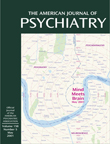Clinical and Cognitive Factors Associated With Verbal Memory Task Performance in Patients With Schizophrenia
Abstract
OBJECTIVE: The authors have previously shown the role of depression, slowing of processing speed, and selective attention deficit in verbal memory task performance in schizophrenia. They wished to determine the specific contribution of each of these factors to various types of memory impairment. METHOD: The negative symptom score from the Positive and Negative Syndrome Scale, the Hamilton Depression Rating Scale score, a measure of processing speed, and a measure of selective attention were entered as predictors in regression analyses. Furthermore, analyses of covariance were conducted on the memory measures to test the significance of the differences between schizophrenic patients and healthy comparison subjects after control for processing speed and selective attention. RESULTS: Depression was associated only with deep encoding reflected by semantic clustering. Selective attention was associated only with superficial encoding reflected by serial recall. Slowing of processing speed was associated with both deep and superficial encoding. Negative symptoms were not associated with memory impairment except for the avolition item from the Scale for the Assessment of Negative Symptoms. Processing speed accounted for all the group differences on the memory measures that reflected superficial encoding. In addition, a subgroup of patients with no or minor depression was not significantly impaired on deep encoding relative to the healthy comparison group. CONCLUSIONS: The authors suggest that verbal memory impairment in schizophrenia is a consequence of depression and slowness, rather than a primary feature of the disease.



